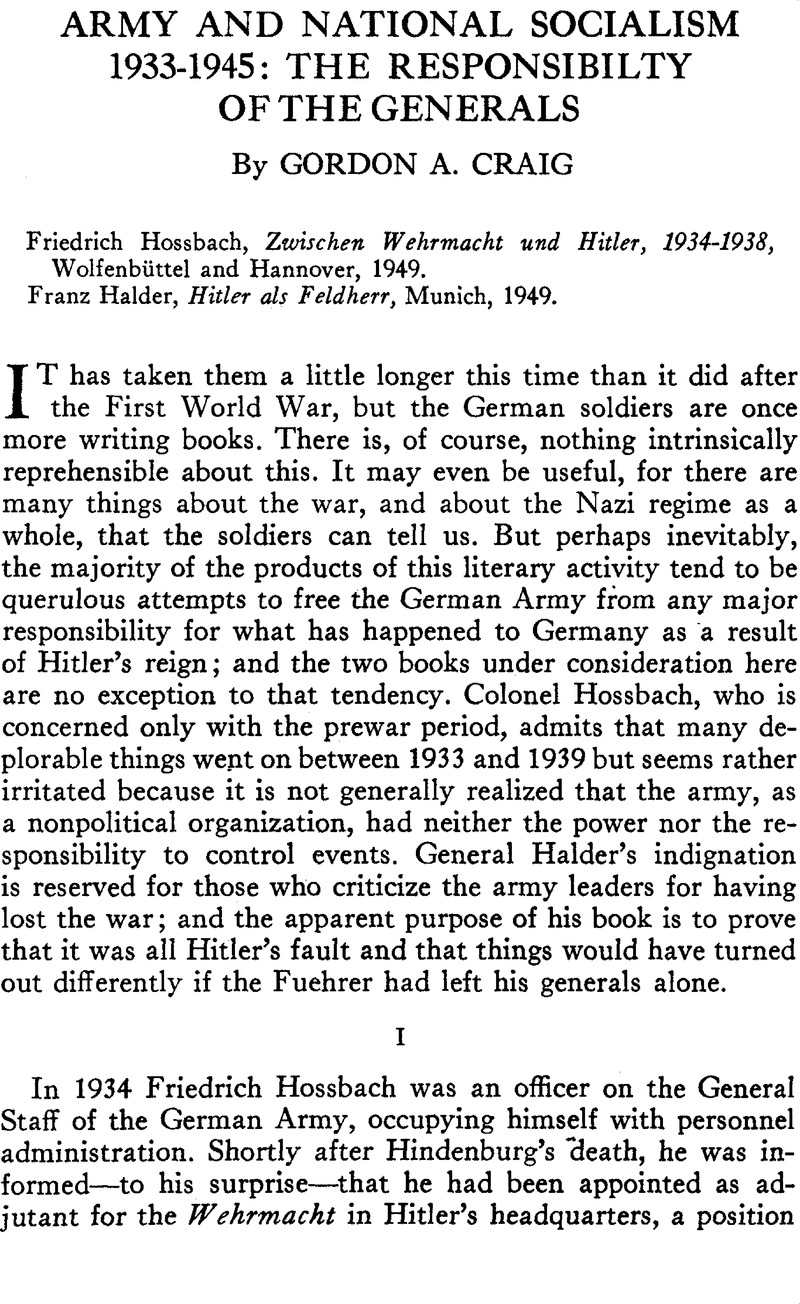No CrossRef data available.
Published online by Cambridge University Press: 18 July 2011

1 On Ribbentrop's optimism in foreign affairs, as compared with the doubts and hesitations of the professional diplomats, see Documents on German Foreign Policy 1918–1945, Washington, Government Printing Office, 1949, Series D, Vol. II, pp. 420, 593.
2 The record of this conference-the so-called Hossbach Minutes-was first printed in Nazi Conspiracy and Aggression, Washington, Government Printing Office, 1946, III, 295 ff. In improved translation, it will be found in Documents on German Foreign Policy, Series D, Vol. I, pp. 29 ff.
3 Stolz, Otto, “Teufelsaustreibung mit Beelzebub,” Die Neue Zeitung, Nord-WestAusgabe, May 20, 1949.Google Scholar
4 Hom, Martin, Halder: Schuld oder Tragik?, Munich, 1948, pp. 34, 37.Google Scholar
5 On the oath to Hitler, used by so many soldiers as an excuse for their continued obedience to Hitler, see the important article by Schwertfeger, Bernhard, “Hindenburgs Tod und der Eid auf den Führer,” Die Wandlung, III (1948), 563–77.Google Scholar Of interest also is Taube, O., “über den Diensteid,” Deutsche Rundschau, June 1946.Google Scholar
6 Lindemann, Helmut, “Die Schuld der Generale,” Deutsche Rundschau, January 1949.Google Scholar
7 Liddell Hart, B. H., The Other Side of the Hill, London, 1948.Google Scholar
8 New York Times, Jan. 14, Feb. 22, 1950. See also Lippmann, Walter, “Germany's Policy and Our Own,” New York Herald Tribune, Jan. 19, 1950.Google Scholar
9 Militärwochenblatt, CXIX, Number 8 (Aug. 25, 1934).
10 Meinecke, Friedrich, Die deutsche Katastrophe: Betrachtungen und Erinnerungen, Wies baden, 1947Google Scholar, chap. vi.
11 Rosinski, Herbert, The German Army, Washington, Infantry Journal, 1944, p. 112.Google Scholar See also the comments in Speidel, Hans, Invasion 1944: ein Beitrag zu Rommels und des Reiches Schicksal, Tübingen and Stuttgart, 1949, p. 31.Google Scholar
12 Pollmüller, Ignaz, “Die Rolle der Reichswehr von 1918 bis 1933,” Frankfurter Hefte, 1. Jahrg., Heft 9 (December 1946), p. 838.Google Scholar
13 Hart, , op. cit., p. 311.Google Scholar
14 See Craig, Gordon A., “Reichswehr and National Socialism: The Policy of Wilhelm Groener, 1928–1932,” Political Science Quarterly, LXIII (June 1948), 194–229.CrossRefGoogle Scholar
15 U. S. Department of the Army, Historical Division, OB West (Atlantic Wall to Sieg fried Line): A Study in Command (German Report Series), II, 73.
16 Writing in 1939 of the “fatal and irreparable mistakes” made by the army leaders, Hermann Rauschning said: “One of the most fundamental, whatever may have been the practical reasons for it, was the moral capitulation in face of the murder of Generals von Schleicher and von Bredow. It was a moral capitulation which has continued to breed capitulation.” The Revolution of Nihilism: Warning to the West, New York, Longmans, Green, 1939, p. 157.
17 On this see, among others, Shulman, Milton, Defeat in the West, New York, Dutton, 1949, p. 7Google Scholaret passim; and The Goebbels Diaries 1942–43, ed. by Louis P. Lochner, New York, Doubleday, 1948, p. 288 et passim.
18 See Ritter's, Gerhard remarks on Zuckmayer's play in Die Neue Zeitung, Nord-WestAusgabe, May 20, 1949.Google Scholar
19 Hassell, Ulrich von, The Fon Hasseil Dianes, 1938–1944, Garden City, Doubleday, 1947, p. 297.Google Scholar
20 “Die Schuld der Generale,” Deutsche Rundschau, January 1949, p. 26.